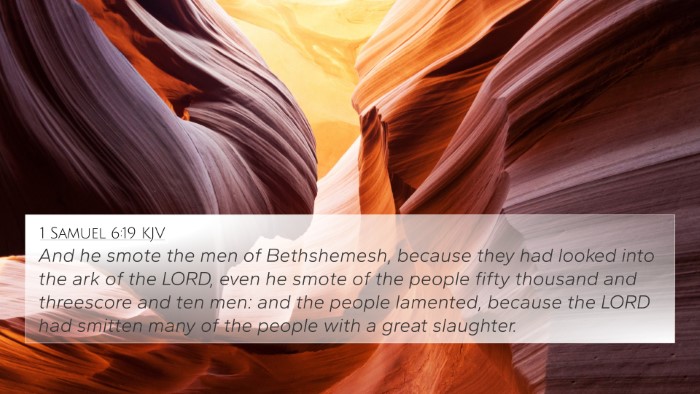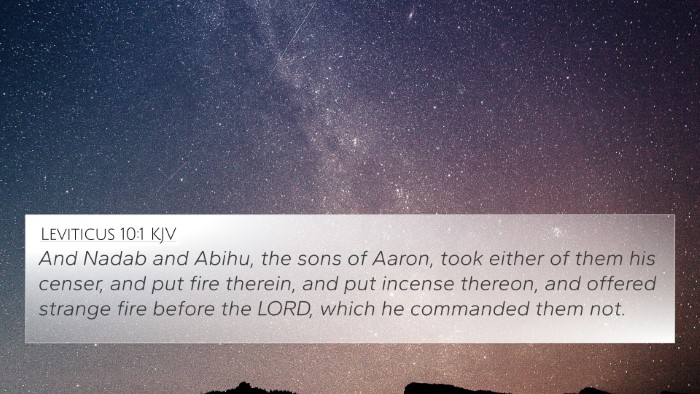Understanding 2 Samuel 6:7
The verse 2 Samuel 6:7 reads: "And the anger of the LORD was kindled against Uzzah; and God smote him there for his error; and there he died by the ark of God."
This particular passage presents a significant moment during King David's attempt to bring the Ark of the Covenant to Jerusalem. The consequences that Uzzah faced for touching the ark highlight the holiness of God and His commands regarding the sacred objects of worship.
Summary of Insights from Public Domain Commentaries
Matthew Henry's Commentary
Matthew Henry notes that Uzzah's action, while seemingly well-intentioned, demonstrated a failure to respect God's established order. He emphasizes that despite Uzzah's sincerity, God's holiness demands that human actions align with divine instructions. The tragedy serves as a reminder of the seriousness of God’s commands and the need for reverential fear. Henry comments on the gravity of sin, suggesting that even commonplace actions, when done in disregard for God's will, can lead to severe consequences.
Albert Barnes' Notes on the Bible
Albert Barnes expounds on the implications of Uzzah's death as a demonstration of divine justice. He articulates that God’s anger was kindled not simply by the act of touching the ark but due to Uzzah acting presumptuously against God’s prescribed way of transporting the Ark. Barnes further highlights the importance of adherence to God's instructions, as given in the Law, regarding worship and the priestly duties associated with the Ark. He underlines that this incident illustrates the broader theme of accountability in the service of God.
Adam Clarke's Commentary
Adam Clarke provides a thorough examination of the cultural context and the significance of Uzzah's action. He notes that while Uzzah's intention may have been to protect the Ark, the act of touching it was contrary to the established law which defined how the Ark should be handled. Clarke asserts that God's response serves to underscore the necessity of observing the divine law strictly and the importance of the fear of God in approaching holy things. Clarke reflects on the lessons of obedience and reverence that this incident imparts to contemporary believers.
Key Themes and Connections
The incident with Uzzah in 2 Samuel 6:7 invites various theological themes and connections with other Scriptures. Here are some critical themes and possible cross-references related to this verse:
- The Holiness of God: Leviticus 10:1-3 - The story of Nadab and Abihu serves as a parallel, demonstrating that unauthorized actions in the presence of God lead to dire consequences.
- Reverence in Worship: Exodus 25:14-15 - Instructions on how to handle the Ark highlight the importance of following God's commands explicitly.
- God's Judgement: Romans 11:22 - The severity of God's judgment is discussed, emphasizing that mercy and severity are part of God's nature.
- Consequences of Disobedience: Joshua 7:12 - The account of Achan illustrates the repercussions of disobedience towards God’s commands.
- Divine Order in Worship: 1 Chronicles 15:13 - David acknowledges the error in not understanding how to approach the Ark properly during its transport.
- God's Sovereignty: Deuteronomy 32:39 - God claims authority over life and death, reinforcing His right to judge Uzzah.
- Innocent Sincerity vs. Divine Command: Matthew 7:21 - Jesus teaches that mere intention is not enough; obedience to God’s will is required.
Application and Lessons
The story of Uzzah conveys essential lessons:
- The importance of understanding and respecting God’s holiness in our worship practices.
- The necessity of adhering to biblical instruction and guidance in all aspects of faith.
- The profound truth that God’s justice reflects His character and cannot be taken lightly.
- Recognizing that sincerity in action does not replace obedience to God's laws.
How This Verse Relates to Other Biblical Texts
In studying 2 Samuel 6:7, we discover rich connections to various other Scriptures, which enhance our understanding of the theme of holiness:
- Hebrews 12:28-29 - This verse presents the idea of serving God acceptably with reverence and godly fear.
- 1 Peter 1:15-16 - Echoing the call to holiness, believers are reminded to be holy in all their conduct.
- Isaiah 57:15 - Reflects God's transcendence and the honor He holds in His holiness.
Whether studying the Old or New Testament, the themes surrounding the holiness and righteousness of God resonate throughout Scripture, highlighting the necessity of aligning our lives and worship with His divine will.








